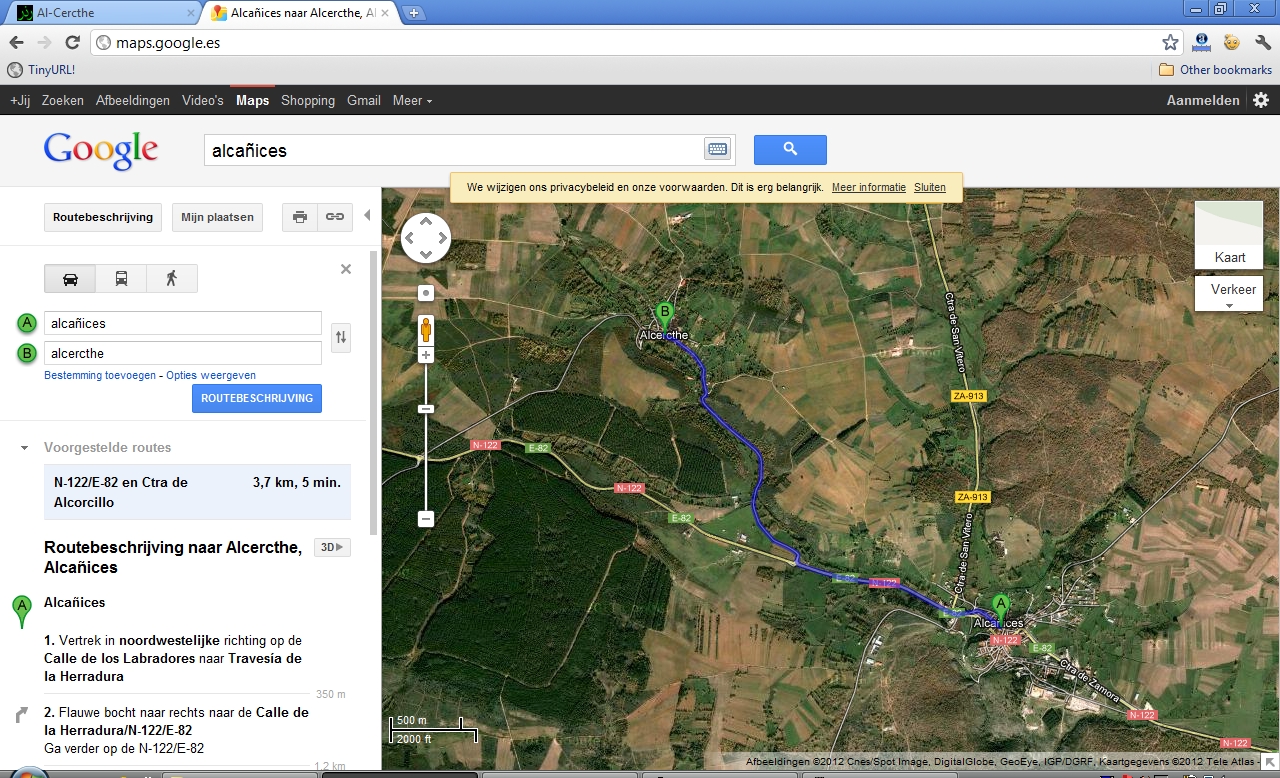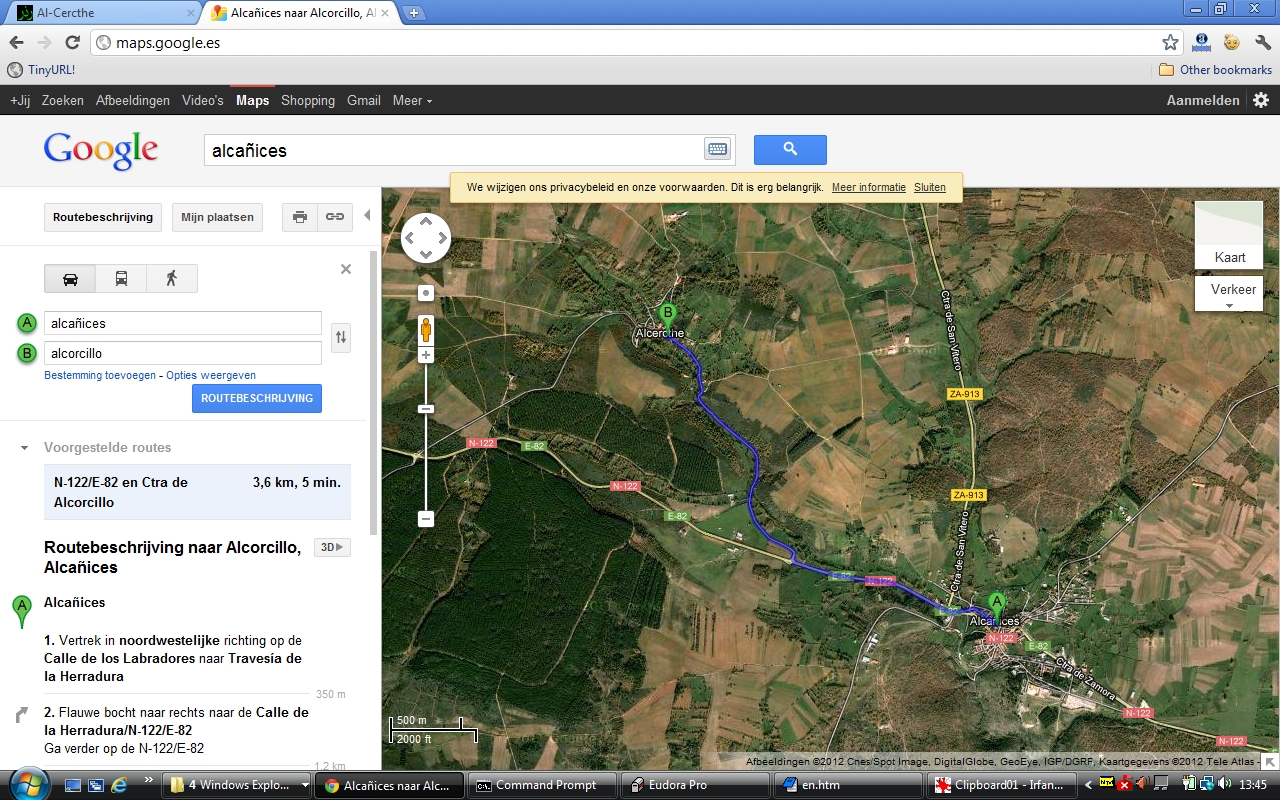Al-Cercthe
Happened 8 February, halfway wrote it 9 February, completed
Pastime
When I’m tired, or bored, or distracted, or whatever the reason may be, I sometimes cheer myself up by travelling in Google Maps and Streetview. Yesterday I remembered often having wondered what the North Spanish or Galician town of Verín would be like. All I knew about it was that it is to the north of Chaves in Portugal, which we did visit and like. I mentioned it in this Dutch article.
Many streets and roads in Spain, unlike those of Portugal, are included in Streetview. So I went to Verín, virtually. It didn’t seem very impressive or special.
(Now (9 Feb) that I check it again, I see quite different images than what I think I saw yesterday. Could it be that I was so tired that I mixed up Verín with some other town?)
I also virtually visited Puebla de Sanabria. I was physically there twice, years ago. One of those times I also saw some agreeable other little town (I don’t manage to reconstruct which one exactly) and I went to some lake or lakes. That was probably the Lago de Sanabria, to the northwest? I can’t remember which roads I took to get there back then and I can’t find them on the map now either.
Hot travelling
While Googlemapping and Streetviewing some more yesterday, I somehow landed around Alcañices. First I thought I had never physically been there, but when zooming out a bit, I realised that that town is along the road between Bragança (in Portugal) and Zamora (in Spain). So that’s why the name sounded so familiar: I must often have seen it on road signs.
While looking at that map, I suddenly noticed a village called Alcercthe:

Now that cannot be true. Alcercthe cannot possibly be the name of a Spanish or Galician town. Believe me, I just know. It’s simply a matter of phonotactics.
Name mangling
I’ve seen such a mangled name before somewhere (and refound some too). It’s probably a mistake. I wondered what that village could really be called. So I read the Spanish Wikipedia article about Alcañices, and saw that it has three pedanías (what’s that? same as a freguesia in Portuguese?), one of them called Alcorcillo. That must be it. Cause if you look at that name pretending you are a piece of software, not a human being, you can see that it is easy to mistake it for Alcercthe.
To make that clearer, I’ll put the names on separate lines for you:
Alcorcillo
Alcercthe
In a ‘noisy’ environment with lots of distracting pixels, a piece of OCR software could easily confuse o’s with e’s. The i with a dot can look betrayingly like a t, and the two l’s, close together in many fonts, are easily mistaken for an h.
Does this mean the names in the satellite images are actually inserted, based on OCR’d older paper maps? Seems likely.
Report it?
OK, so it’s a simple mistake. I wanted to tell Google about it, so they could hint their electronic map supplier. Some help text mentioned an option under the right mouse button. But it wasn’t available, and where it was, it was greyed out.
So Google prefers not to be told about this? I decided to write this article instead. They’ll probably never read it and I don’t know how to make them aware of its existence. So I won’t even try. Moreover, I hope they won’t correct the error, because that would wreck my story. Well, even if they do, I still have the screenshot.
Meanwhile, Microsoft’s competing Bing Maps do have the correct name on their maps. No doubt they have some mistakes somewhere too, where in turn Google maps has it right. Such is life.
But they know!
The interesting thing about Google Maps is that when
you ask it for directions from Alcañices to Alcorcillo,
it does actually know where that is. So although the
name is wrong on the map, they have the correct name
in some database of geographical names. Here’s
a snapshot of the result of the query, first with
the wrong name:

Then with the correct name:
 (click to enlarge images).
(click to enlarge images).
Interestingly, with the wrong name, the distance is 3.7 kilometres instead of 3.6. Maybe because when almost there, you have to make a detour of 100 m to a remote farm house, to ask the locals what the secret real name of their village is, in order to be allowed to enter it?
The password is Al-Cercthe, obviously of Moorish origin!
I am silly and weird
All this reminded me of silly mind games I sometimes play by myself, now and already as long ago as the 1980s or 1990s. For example, I used to reverse the name of the ancient and modern Dutch city of Utrecht, and got Thcertu. You could read that as the Portuguese word for ‘certain’, said with a Castilian accent:
- Th as in English ‘think’.
- C as in Spanish ‘cerca’. In large parts of Spain, that is pronounced with that same sound of English ‘think’, so in this hypothetical word, it is written twice.
- The u at the end indicates how in Portuguese, the unstressed letter o is pronounced with a high vowel, [u].
I find such things funny, amusing and fascinating. If you don’t, I can quite understand that. I am silly and weird. But I do no harm to anyone by being like that, so I won’t try to be somebody I’m not.
More silliness
Another such silly game is to interpret the Dutch name for Egypt, ‘Egypte’, as if it were a Hungarian name, but with a Dutch schwa sound (which the Hungarian language does not have) at the end. So you’d get as a pronunciation, in the IPA alphabet: [ɛɟptɘ], or in Kirshenbaum’s ASCIIisation: [EJpt@], and in X-Sampa: [Ed'pt@].
Unpronounceable in pretty much any language. But fun. For me.
Another source of joy is to interpret the name Microsoft as Dutch, but halfway according to the Turkish spelling rules, including a misunderstanding on my part as if the Turkish letter c and the Classical Arabic ج would correspond to a Hungarian gy. In fact, they are more like a Hungarian dzs (IPA: dʒ), or so I’ve been told in sci.lang and elsewhere.
Sticking to that misunderstanding, Microsoft would then be pronounced [miɟrosɔft] (Kirshenbaum: [miJrosOft], X-Sampa: [mid'rosOft]). Not difficult, is it?
See also
More OCR errors in Google Maps
(10 February 2012) and
I wasn’t the only one"
(11 February 2012).
Addition 10 August 2012
Meanwhile, the error has been corrected, the village is now correctly named Alcorcillo, and asking Google Maps for directions to Alcercthe is to no avail.
Good I saved the screenshot so I can prove it was really once wrong.
I get a somewhat nostalgic feeling as a result of this correction, because I find that Alcercthe, although no Spanish locality could possibly have such a name, is a really beautiful and fascinating name too.
The other incorrect names, which I mentioned in my follow-up article (see above under ‘see also’) are also all correct now. Correct or removed. So do people at Google company actually read my articles??
I’m flattered. But it may have been a coincidence. Corrections that have been in the pipeline for years and were only implemented recently?
Copyright © 2012, R. Harmsen, all rights reserved.